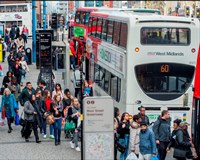
The ‘disease’ of road congestion has brought average traffic speeds to below 10mph in the busiest of Britain’s cities and reduced some bus routes to walking pace – and it’s hitting the industry hard
A recently published report has found that journey times across the nation are increasing by 10% per year, a rate which, if it continues, will cost an estimated 5,000 jobs per year.
The report, titled The Impact of Congestion on Bus Passengers, found that if journey times continue their current rate of decline, bus passenger numbers will drop by between 10% and 14% every 10 years, putting the future of the bus sector under threat.
Prof David Begg, Visiting Professor at Plymouth University and former Chairman of the Government’s Commission for Integrated Transport, who wrote the report, said:
“Traffic congestion is a disease which, if left unchecked, will destroy the bus sector. If the trend is allowed to continue, then our urban buses will no longer represent a viable mode of transport for the majority of customers.
“We have to change travel behaviour. If we don’t try to influence people’s travel choices, it will mean that we all have no choice but to sit in ever increasing traffic jams.”
According to the report, the boom in popularity for online shopping is partly to blame – more orders means more delivery vans on the road. A surge in Uber drivers is also reportedly exacerbating the problem.
The traffic situation is reportedly set to worsen, with expectations of 55% traffic growth by 2040. Other measures detailed in the report as under consideration include charging van drivers making deliveries at peak times; introducing more bus lanes to cities; and encouraging bus operators to provide more up-to-date travel information for passengers.
Peter Coates, Managing Director of National Express, commented: “We know our customers are used to contactless payments. So we are in the process of buying new contactless ticket machines for all our buses.”
Centro, the delivery arm of the West Midlands Integrated Transport Authority (ITA), along with bus operators, will invest £150m over five years into the UK’s first Bus Alliance which was signed last November. The aim of the investment is to bring cleaner buses, smartcard ticketing and road changes into operation to try and speed up journeys and increase bus reliability.
Councillor John McNicholas, Chairman of the ITA’s Transport Delivery Committee which oversees Centro, added: “Congestion stifles economic growth, pollutes our air and generally lowers the quality of life for the people of the West Midlands.
“That’s why we are working hard to deliver an attractive and fully integrated transport network that makes it easier than ever for people to leave their cars at home and travel in a greener way.”
Claire Haigh, Chief Executive of Greener Journeys said: “A fully loaded double decker bus can take 75 cars off the road. Giving buses more priority on the roads and introducing contactless payments would make journeys faster and more reliable, encouraging more people to leave their cars at home and easing traffic to benefit all road users.”

